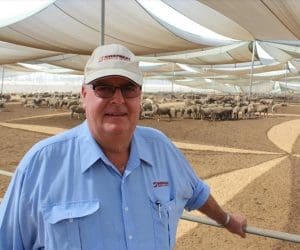
WAFarmers export committee chairperson Jeff Murray
WAFARMERS has accused the RSPCA of chasing an “anti-livestock” agenda in its opposition to the recent export licence approval for Western Australian company Rural Exports and Trading WA.
Following RETWA’s licence approval by the Department of Agriculture and Water Resources last week, RSPCA Australia senior policy officer Jed Goodfellow criticised DAFWA’s new stocking density rules for from November 1 until new standards are approved next year.
Dr Goodfellow said the move to increase the stocking densities over the allometric testing methods (for the northern summer months period) meant exporters could cram three 50kg sheep into a space that was barely larger than a square metre.
“At these densities sheep will not be able to lie down at the same time, nor will they be able to easily access feed and water troughs, over a journey of some three to four weeks at sea,” Dr Goodfellow said.
The RSPCA said the new stocking density regime completely ignores the advice of the Australian Veterinary Association which advised government that the stocking density reductions introduced in July were “the minimum amount needed to alleviate adverse welfare outcomes and must be implemented across all body weights and all months of the year”.
However, WAFarmers export committee chairperson Jeff Murray said in a letter to editors that RSPCA’s reaction to the RETWA licence approval and stocking density rules needed to be called out.
“Unfortunately, the RSPCA is increasingly drawn into a battle for activist donations, leaving it to chase an agenda which is clearly more ‘anti-livestock’ and ‘anti-meat’ than ‘pro-welfare’.
“I have often defended the RSPCA, arguing that it is a far more reasonable organisation than the likes of Animals Australia or PETA. But now the RPSCA is proving me wrong,” Mr Murray said.
Mr Murray said despite the new technology and ongoing research and development which will ensure animal welfare continues to improve in the live trade, the RSPCA just wants to shut the industry down.
“Export businesses like RETWA are willing to ship sheep at stocking rates of at least 17.5 per cent below the existing world’s-best standards, meaning producers might have a chance of selling the backlog of half a million sheep which haven’t been exported due to the suspension of trade over winter.
“The RSPCA doesn’t seem to give any thought to the on-farm welfare risks this backlog has caused,” he said.
Mr Murray said it should be recognised that earlier this month in what was the first voyage to the Middle East in months, the Maysora’s sheep mortality rate was 0.13 percent of more than 20,000 sheep shipped. Of the 10,000 cattle on board, single-digit mortalities occurred.
“This is an excellent result.
Farmers’ commitment to animal welfare treated with contempt – Murray
Mr Murray said the RSPCA stopped listening to the livestock industry long ago.
“It is now a one-way conversation in which our practical husbandry experience and proven commitment to animal welfare is treated with contempt.”
Hesaid until the new Australian Standards for the Export of Livestock are introduced next year, the 17.5 percent reduction should satisfy any reasonable person, particularly given the comprehensive ventilation auditing that is completed on vessels and the presence of Australian stockmen, an Australian Government accredited veterinarian and an Independent Observer on every voyage.
“But the RSPCA will never be satisfied.
“They’d criticise any stocking rate, regardless of what the regulator says, or what the best available evidence supports.”
Mr Murray said the Federal regulator has said the interim stocking rates for the northern winter are guided by first-hand feedback from the veterinarians who have worked as Independent Observers on live export voyages to the Middle East.
“These observers are far better placed to provide credible feedback to the regulator than a professional activist organisation in Canberra which is merely looking for headlines and donations.”
The department recently issued an export advisory notice detailing changes to conditions for the export of sheep by sea to the Middle East from November 1 until the implementation of revised Australian Standards for the Export of Livestock in 2019. This meant stocking densities for vessels carrying sheep to the Middle East via the Persian Gulf and Red Sea will 17.5 percent lower than the current ASEL and the agreed heat stress assessment plan recommended in the McCarthy Review. Vessels will also have to have pen air turnover independently verified by a qualified mechanical engineer.
Exporters are also required to comply with other changes recommended by Dr Michael McCarthy in his review of the conditions for the export of sheep to the Middle East during the northern hemisphere summer, including:
the notifiable mortality level for sheep exported by sea to the Middle East will remain at 1pc
independent observers will continue on every sheep voyage, reporting back daily to the department (including footage), to support verification and compliance activities.
- reducing the notifiable mortality level for sheep exported by sea to the Middle East from 2 to 1 per cent.

Couldn’t have said it better Katrina.